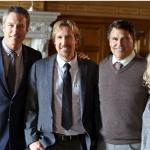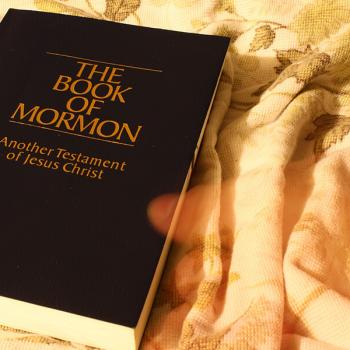 In hindsight, all history seems inevitable. World War II’s Normandy invasion happened just the way it should; so did Washington’s crossing to save the Revolutionary War, and even the crucifixion. Yet, Jesus himself cried, “Why has Thou forsaken me?” The new film “Paul, Apostle of Christ” by Andrew Hyatt could be said to have double hindsight. It looks back on Luke’s account in the Bible, and Luke himself was writing Paul’s story decades after the fact.
In hindsight, all history seems inevitable. World War II’s Normandy invasion happened just the way it should; so did Washington’s crossing to save the Revolutionary War, and even the crucifixion. Yet, Jesus himself cried, “Why has Thou forsaken me?” The new film “Paul, Apostle of Christ” by Andrew Hyatt could be said to have double hindsight. It looks back on Luke’s account in the Bible, and Luke himself was writing Paul’s story decades after the fact.
I am a filmmaker and film scholar with a lifelong fascination with Paul and have done a film and a book on the apostle. I’m not alone; there is a long list of award-winning directors who have wanted to tackle the subject: D.W. Griffith, Orson Welles, Frank Capra, Martin Scorsese, among others. But there has been little industry or audience appetite for a full-blooded saga of this volcanic, misunderstood man. So, I applaud Andrew Hyatt, who produced, directed and co-wrote this film, for trying.
I wish I could say Hyatt succeeded, but he manages to do what I would have thought was impossible: make Paul a rather one-dimensional character.
It becomes apparent quickly that this film has a superficial understanding of—or chooses to ignore—the turbulent church in which the apostle played a role. And the Paul of this film is not the historical person drawn from his own raw, powerful words. Instead, he is the later imagined heroic figure, speaking in inspirational aphorisms—like a superhero worshipped by his biographer, Luke. “Paul, Apostle of Christ” shares a common aspect with many faith-based movies: a ”wink wink” homage that reinforces belief but does not forge the actual human story.
In Acts, as all scholars recognize, Luke tells a mostly triumphant tale, like a Christian Aeneid, which begins with battles in the East and makes its ways to Rome (“end of the world”), with Paul facing persecution, snakes, shipwrecks and multiple perils. Paul did struggle on his journey, but his personal letters tell a not so heroic story; they actually writhe with controversy, are combative, and at times expose how truly dysfunctional was the early Church.
Luke and Paul
Most of the original quarrels over what was canonical concerning the development of Christianity were resolved: some books were voted in and some books voted out. Two of the main sources for what remains are Luke and Paul, the two main characters of the film. In fact, Luke, played by Jim Caviezel, is really the star of the movie! “Paul, Apostle of Christ” reflects the established Church’s Bible—with the addition of legend concerning its days confronting Nero.
How one comes down on these source issues often depends on one’s views of the Bible and of the trustworthiness of the church. Suffice it to say, both Luke and Paul are sources not always in agreement, and they sometimes clash on key issues. The most significant being the life of Paul, the subject of this film. For openers, Paul wrote his letters between A.D. 50–60, and Luke wrote Acts somewhere after A.D. 80. Between was the Jewish War (A.D. 66–70), which ended the Jewish presence in Jerusalem and forced the movement out to the Gentile region as far west as Rome, where the film takes place.
When sources don’t agree, scholars have to determine which author receives primacy, and for centuries in this case, it has been Acts of the Apostles. Which brings me to my main critique: Even if granted that Luke was Paul’s traveling companion and possibly even his “medical” doctor, the film takes place largely post-Acts and Paul’s Letters, in a world reserved for church legend. In other words, the setting is apocryphal. That might have been Hyatt’s valid artistic choice because this was the time when Christians were most under siege by Nero, but it avoids the core facts of what we actually know.
Lost Complexities
Paul in this film is a prisoner during the nascent movement’s struggles in a stereotypical Rome, where almost everyone is Roman Army and engaged in or speaking in polytheistic excess. “Romans kills orphans and women.” “Romans are without hope in the afterlife.” The truth is that Rome was infused with religion, including the Imperial cult, that offered a language for Paul to communicate the ideas of “Lord” (kyrios) and “Savior (soter) and good news (evangelion). Paul depended on Roman power, law, roads, and the dignity of his Roman citizenship; according to the Bible, it saves his apostleship. His own churches located in the Greek cities (Philippi) were made up of retired Roman army. In the end, it was the soldiers and magistrates who protected him from his own people and his own church. Complexities that are lost in the simplicity of the film.
And for the record, where is the rock, the Apostle Peter, the future Bishop of Rome?! Rome was never Paul’s city, nor was the church (possibly a synagogue) founded there, and Paul tells us so in the Bible. He only wrote to the people of Rome in his famous letter to the Romans (15:30–31) to: a) raise money to support his trip to Spain before the end of time; b) try to end the conflict between Gentiles and Jews in the church, and c) clear up his problems with Jesus’s brother James by returning to Jerusalem with his collection as a symbol of support. Goals that did not work and led to Paul’s tragedy.
Yet, none of Paul’s troubles, which should be part of the Lukan tale, are mentioned. Instead, in the film he is sought out in prison for Christian wisdom, and his every word is hung on by Luke as if both were aware of actually dictating the Bible, quite a literalist or fundamentalist view. In fact, after Paul’s rejection in Jerusalem by his Jewish people and Jewish Christians, his life was under constant threat from Jewish authority, including the High Priest, and he was forgotten by his Christian brothers.
What the film also ignores is that Paul’s reaching Rome was not the climactic moment in a journey of faith, it was the default position for an apostle who was betrayed by his own people and must have felt he had botched God’s plan or wrongly guided God’s people. After all, since some time around A.D. 50 he had promised the end of days in his extended efforts to save Gentiles for the rapture, an event that had yet to occur. Now he was in exile from his people and a prisoner of the Roman courts.
Hyatt also makes the typical faith-based movie error of presenting a Christian world without enough of its real-world conflict or context. The movie’s characters are not part of the sociopolitical or ethnic bodies, the social clubs or ekklesia that Paul tapped into. Instead, Christians live as spirits (gnostics) with an internal knowledge of “Christ,” all merely waiting in the shadows for the new world to come. Because of this narrow, historical perspective, the film crumbles under its lack of plot.
Errors of Interpretation
And there are a few errors of interpretation that will catch the attention of students of this period. The film has Paul, played by James Faulkner, after his one-time-only conversion (which many scholars think of as a commission), feeling guilty about his past as he transitioned from Judaism to Christianity. The historical fact is that he remained a Jew throughout his life. Also, Paul having his head cut off was not an act of shame but an act of honor, which preserved his head for the family; it was the opposite of an execution on a cross, which was for criminals, not a citizen of Rome.
The script (co-written by Hyatt) is biblical cherry-picking of well-known, first-tier lines from the Bible, and they are delivered with one-note breathy gravitas. Still, they have the power to inspire. For instance, the most famous words of Paul, quoted at every wedding, from Corinthian 13 (though these words were originally written to end the conflicts between those worshippers in the church who chose Paul or Peter or Apollos for all the wrong reasons). The music by Jan A.P. Kaczmarek is solid and helps to carry the load for what is not captured on the screen.
Due to the lack of dramatic conflict the acting is average to unmemorable with two exceptions: Caviezel’s solid job as the hopeful, focused Luke; and Olivier Martinez, with a Spanish accent close enough to Latin to help the believability of the Roman soldier he plays—it’s a performance, in the midst of mythical jests and absent of real Bible textuality, quite worthy of praise!
What the film fails to capture is the true and enigmatic Paul, embattled, his gospel rejected by his own believers— the Paul who is “without Greek or Jew, Master or Slave, Man and Woman.” His was a life defined by a challenge to his apostolic legitimacy, and because of this core conflict, he never fully reconciled with his own visions. Without question, it is this Paul that triumphs, but only after death, and only after Christian thought is embraced by Roman power. Now, that irony, or the strange mysteries of faith, or the failings of Paul’s inter-Christian story, or human will and divine destiny, remains a film worth making.
Robert Orlando is an author, filmmaker whose most recent films are “Apostle Paul: A Polite Bribe,” and “Silence Patton.” Presently he is working on a documentary, “The Divine Plan, the story of Reagan, John Paul II, and the Fall of Communism,” and a sequel on Paul titled “Apostle Paul, The Final Verdict.”













